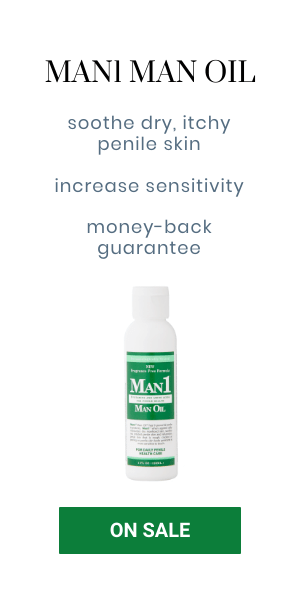Skin-related conditions are not only uncomfortable; they can also be embarrassing, and people who have problem skin often feel socially isolated. Men with flaky, scaly penis skin may be especially affected, even when the condition is not contagious, because the associated itching and discomfort, not to mention the aesthetic issues related to unhealthy-looking skin, can interfere with their ability to connect with a partner and enjoy normal sexual relations. Fortunately, most conditions that affect the penile skin can be treated and managed with the right approach to penis care. Some of the more common causes of dry, scaly penis skin are described here.
What causes scaly penis skin?
There are several different conditions that can cause the appearance of scaly, flaky skin. Some of these affect the entire body, and some only impact the penis and groin area.
1) Psoriasis. This condition is characterized by red patches of skin that typically have a silvery, flaky-looking surface. It is caused by an immune system reaction in which the body overproduces skin cells, resulting in the formation of plaques. These can be extremely itchy, and they can appear all over the body.
Treating psoriasis usually involves the application of special medicated creams, accompanied by the use of a high-end moisturizer.
2) Eczema. Like psoriasis, eczema (also known as dermatitis) is the result of an inappropriate immune reaction. Eczema can affect all parts of the body and appears as a red rash, with bumps that sometimes develop a scaly surface. A common type of eczema is contact dermatitis, which occurs when a person comes in contact with an irritating substance. Chemicals in personal care products, certain fabrics and environmental irritants are common triggers.
Treatment for contact dermatitis consists of cleaning the affected area thoroughly and avoiding contact with known triggers. Use of a cortisone cream and moisturizer may also be recommended to manage the itching and soothe the affected skin.
3) Jock itch. This fungal infection typically affects the groin area. It appears as a red, spreading rash that tends to expand outward from a central point. Red bumps with a scaly surface are typical, and the edges of the rash are usually clearly defined. Mild to severe itching may occur. Jock itch is caused by spores of the tinea cruris fungus, which thrives in warm, moist areas.
Treating jock itch involves the use of a topical antifungal cream; men can reduce their risk of developing an infection by using clean, dry towels, wearing clean underwear and avoiding sharing personal items like clothing and razors.
4) Scabies. Scabies consists of a red, scaly rash on the skin that is caused by the saliva of scabies mites. These tiny insects can easily be transferred from one person to another, and they can be found in bedding, clothing and other fabrics.
Treating scabies requires the use of a prescription cream; to eliminate the mites, all clothing, bedding and even carpeting should be thoroughly cleaned.
5) Icthyosis. This condition is relatively uncommon and tends to run in families. It is characterized by rough skin that has a similar appearance to fish scales, and it can appear all over the body. It is not necessarily itchy, and it usually goes away over time. Topical creams may be used to help remove the scales and improve the appearance of the skin.
Coping with itchy, flaky penis skin
Dealing with flaky penile skin can be difficult, especially when it is related to a chronic condition. Men should always follow their doctor’s recommendations for treatment, but these tips may also help:
– Practice good nutrition. The body needs a range of nutrients, including vitamins and minerals, protein, heart-healthy fats and fiber, in order to repair damaged tissue and reduce the risk of developing problems in the first place. On the other hand, men should avoid foods that trigger unpleasant skin reactions.
– Stay hydrated. Maintaining an adequate level of hydration can boost the skin’s own healing ability, as well as providing much-needed moisture for parched, itchy skin.
– Avoid drying soaps and detergents. Opting for unscented, hypoallergenic cleansers can help keep the skin clean without drying it out, which can make the flaking and scaling worse.
– Use a penis health crème (health professionals recommend Man1 Man Oil). Moisturizing products that are made specifically for the penile skin can provide much-needed relief for itching and dryness, while providing nutrient support to help speed healing. Products that contain vitamins A and E may be especially beneficial, as these are often used for treating conditions such as psoriasis and eczema. Creams and moisturizers should never be applied to broken skin.
